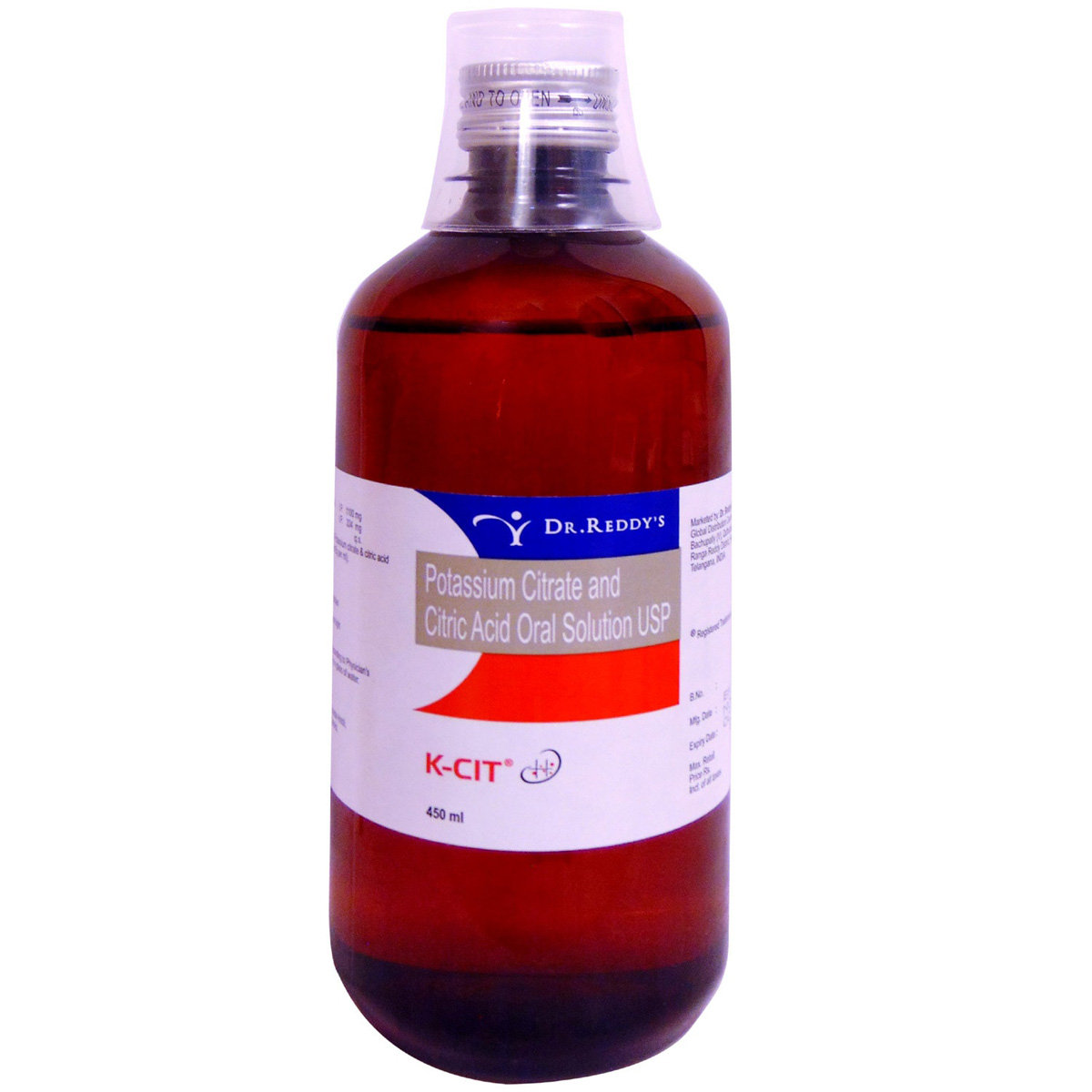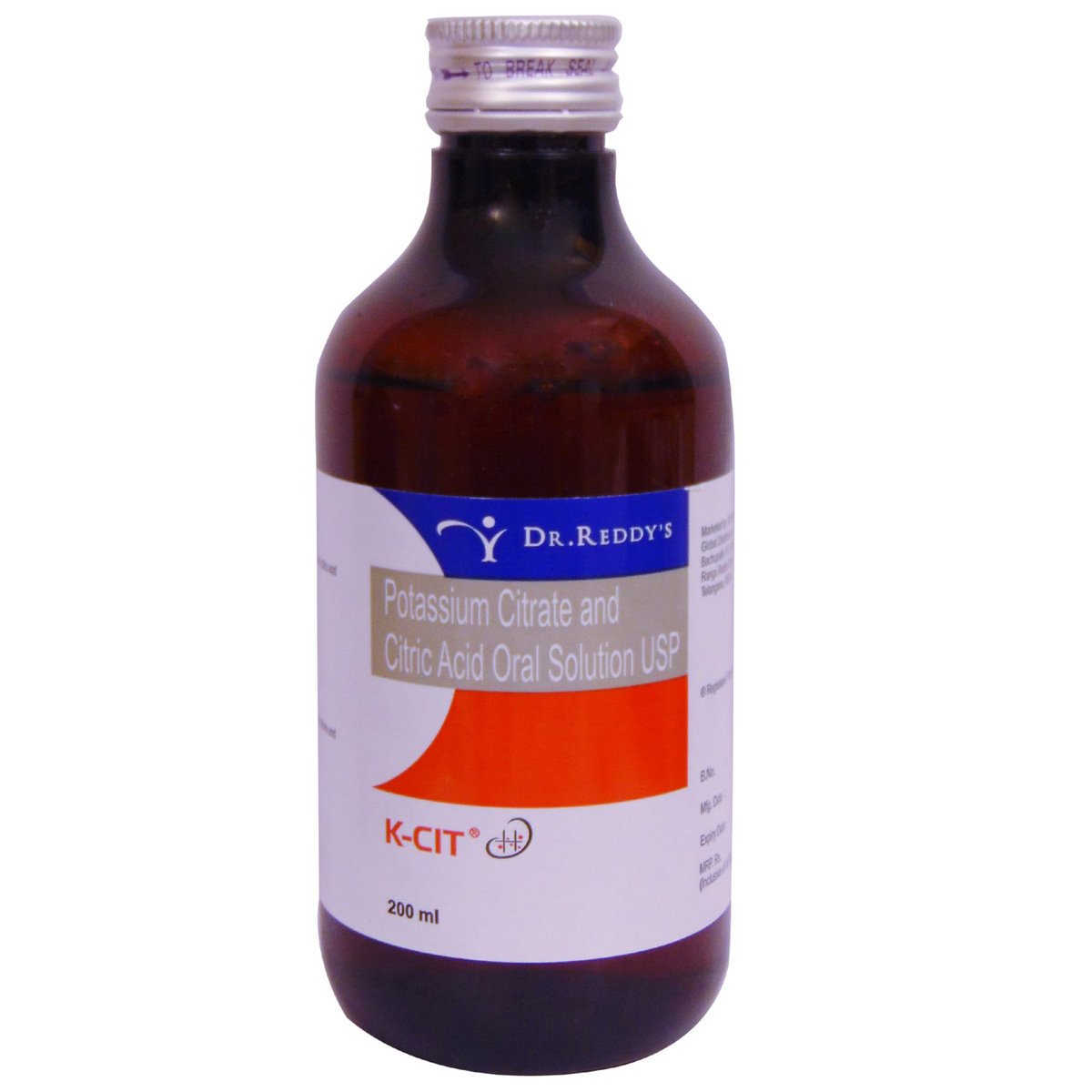Citric Acid+potassium Citrate
About Citric Acid+potassium Citrate
Citric Acid+potassium Citrate belongs to the class of medications called ‘alkalinizing agents’ used to prevent gout and kidney stones and treat metabolic acidosis in patients with kidney diseases. Gout is a type of arthritis in which uric acid crystals are deposited in the joints leading to severe pain, redness, and swelling. A kidney stone is a condition in which hard deposits are accumulated in the kidney forming stones. Metabolic acidosis is a condition in which excess acid is accumulated in the body due to kidney failure.
Citric Acid+potassium Citrate combines two medicines: Citric acid and Potassium citrate. Citric acid prevents the formation of deposits by binding with the salts and also breaks down the small deposits that are beginning to form. Potassium citrate is alkaline in nature and works by neutralizing the acids in the blood and urine, thereby preventing the accumulation of salts in the body.
Citric Acid+potassium Citrate is available in the form of oral liquid. You should take this medicine as prescribed by your doctor. Citric Acid+potassium Citrate may cause side effects such as diarrhoea, stomach upset, nausea, and vomiting. These side effects are mild and temporary. However, inform your doctor if any of these side effects persist or get worsen.
To treat your condition, continue taking Citric Acid+potassium Citrate for as long as your doctor has prescribed it. Do not take Citric Acid+potassium Citrate if you are allergic to Citric acid, potassium citrate, or other ingredients. Inform your doctor if you are pregnant or breastfeeding before taking the Citric Acid+potassium Citrate. It should not be used in patients with severe kidney failure, severe heart damage, severe dehydration, heat cramps, Addison’s disease (an adrenal gland disorder), or hyperkalemia (high blood potassium levels). Citric Acid+potassium Citrate should not be given to children unless prescribed by a doctor. Avoid alcohol consumption while taking Citric Acid+potassium Citrate as it might increase certain side-effects. Keep your doctor informed about all the medicines you are taking and your health condition to rule out any unpleasant side effects.
Uses of Citric Acid+potassium Citrate
Medicinal Benefits
Citric Acid+potassium Citrate is a combination of two medicines: Citric acid and Potassium citrate, primarily used to prevent gout and kidney stones and treat metabolic acidosis in patients with kidney diseases. Citric acid prevents the formation of deposits by binding with the salts and also breaks down the small deposits that are beginning to form. Potassium citrate is alkaline in nature and works by neutralizing the acids in the blood and urine. Citric Acid+potassium Citrate effectively reduces the crystallization of stone-forming salts such as calcium oxalate (in kidney stones) and uric acid (in gout).
Directions for Use
Storage
Side Effects of Citric Acid+potassium Citrate
- Nausea
- Vomiting
- Diahrrea
- Stomach upset
- Black, tarry, or bloody stools
Drug Warnings
Citric Acid+potassium Citrate should be used with caution in patients with fluid loss (dehydration), heat cramps, high potassium levels, a certain problem that causes periods of muscle weakness (adynamia episodica hereditaria), kidney disease, heart disease, unable to pass urine, or untreated Addison's disease, toxaemia of pregnancy (high blood pressure during pregnancy), oedema (swelling), and chronic diarrhoea. Do not take antacids without consulting your doctor while using Citric Acid+potassium Citrate, as it may lead to electrolyte imbalances. Citric Acid+potassium Citrate should not be used in pregnancy or breastfeeding unless the doctor has told you to do so. Do not take food containing potassium supplements or other products that contain potassium, as they may worsen your condition. Stop using Citric Acid+potassium Citrate and consult a doctor immediately if you notice muscle twitching, swelling, weakness, mood changes, weight gain, increased heart rate, black or tarry stools, severe diarrhoea, or convulsions (fits) while using Citric Acid+potassium Citrate.
Drug Interactions
Drug-drug interactions: Citric Acid+potassium Citrate may interact with an antacid containing aluminium (aluminium hydroxide, aluminium carbonate), pain killer (aspirin), antipsychotic medication (lithium), a medication used to treat urinary tract infection (methenamine, nitrofurantoin), and a medication used to treat arrhythmia (quinidine), potassium-sparing diuretics (triamterene, spironolactone, amiloride), antihistamines (diphenhydramine, brompheniramine), antihypertensive (enalapril, captopril, fosinopril), antidepressants (amitriptyline, amoxapine, desipramine, doxepin, imipramine), medicines used to treat overactive bladder (solifenacin, darifenacin).
Drug-food interactions: Avoid taking potassium supplements, salt substitutes, or low-salt dietary products while taking Citric Acid+potassium Citrate.
Drug-disease interactions: Citric Acid+potassium Citrate should be avoided in patients with electrolyte imbalances, inflammatory bowel disease, intestinal blockage, severe dehydration, urination problems, heart failure, and Addison’s disease (adrenal gland disorder).
Drug-Drug Interactions Checker List:
Safety Advice

Alcohol
cautionAlcohol consumption may worsen your health condition.

Pregnancy
cautionCitric Acid+potassium Citrate is a pregnancy category C drug. It should not be taken until prescribed. Your doctor will weigh the benefits and potential risks before prescribing them. Please consult your doctor.

Breast Feeding
cautionThere is limited data on how Citric Acid+potassium Citrate affects breastfeeding. Please consult your doctor before taking Citric Acid+potassium Citrate. Your doctor will weigh the benefits and potential risks before prescribing them.

Driving
safe if prescribedCitric Acid+potassium Citrate may not affect your ability to drive.

Liver
safe if prescribedCitric Acid+potassium Citrate can be used in patients with liver diseases if prescribed.

Kidney
cautionCitric Acid+potassium Citrate should be used with caution in patients with kidney diseases. Dose adjustments may be necessary.

Children
cautionThe safety and effectiveness of Citric Acid+potassium Citrate in children have not been established. Please consult your doctor before giving Citric Acid+potassium Citrate to children.
Habit Forming
Diet & Lifestyle Advise
- Drink plenty of fluids.
- Limit consumption of spinach, wheat bran, nuts, beets, and dairy products.
- Avoid high salt intake and foods containing baking soda.
- Do not take vitamin C and calcium supplements without your doctor’s advice.
- Physical activity helps strengthen muscles and relieves joint stiffness. Gentle activities like 20-30minutes of walking or swimming would be helpful.
- Performing yoga may also help in improving joint flexibility and pain management.
- Maintain a healthy weight by performing regular low-strain exercises and eating healthy food.
- Get adequate sleep, as resting the muscles can help reduce inflammation and swelling.
- Follow heat or cold therapy, and apply a cold or hot compress on the joints for 15-20minutes regularly.
- De-stress yourself by meditating, reading books, taking a warm bubble bath or listening to soothing music.
- Acupuncture, massage and physical therapy may also be helpful.
- Eat food rich in antioxidants such as berries, spinach, kidney beans, dark chocolate, etc.
- Foods containing flavonoids help in reducing inflammation. These include soy, berries, broccoli, grapes and green tea.
- Avoid smoking and alcohol consumption.
Special Advise
- Following a specific diet plan created by your nutritionist to control your health condition is essential.
- Your doctor may advise you to take blood and urine tests while using Citric Acid+potassium Citrate to examine your health condition and ensure that this medicine treats your condition.
Patients Concern
Disease/Condition Glossary
Gout: Gout is a type of arthritis in which patients experience severe pain, redness, and swelling in joints. The most common affected area is the joint at the base of the big toe. Patients with gout may often experience acute attacks that result in sudden and severe pain. It occurs due to a condition called hyperuricemia (high uric acid levels in the body). The excess uric acid deposit and crystallize in the joints leading to pain and inflammation.
Kidney stones: It is a condition in which hard deposits occur in the kidney leading to stones. A kidney stone comprises mainly four types of calcium oxalate, uric acid, struvite, and cystine. It is due to the increased level of uric acid in the body. As a result, uric acid crystals start depositing in the kidney, known as renal calculi/nephrolithiasis/urolithiasis.
Metabolic acidosis: Metabolic acidosis is a condition in which excess acid is accumulated in the body due to the kidney's inability to remove excess acid from the body. It can be of various types, such as lactic acidosis (build-up of lactic acid), diabetic acidosis (build-up of ketone bodies), and hyperchloremic acidosis (build-up of sodium bicarbonate). It is mostly seen in patients with kidney impairment.
FAQs
Citric Acid+potassium Citrate combines two medicines: Citric acid and Potassium citrate. Citric acid and Potassium citrate are alkaline in nature and work by neutralizing the blood and urine acids.
Citric Acid+potassium Citrate should not be used along with antacids as it may cause electrolyte imbalances. So, before taking Citric Acid+potassium Citrate, inform your doctor about all the prescription or non-prescription medicines you are taking.
You should closely monitor your regular blood tests and electrocardiograms to ensure safety, renal function, and electrolytes. Besides this, frequent checks of potassium levels are required for kidney impairments.
Citric Acid+potassium Citrate should be taken as long as your doctor prescribes it for you. Consult your doctor before stopping any medicine, don't stop your medication suddenly.
Do not take diuretics like triamterene, spironolactone, or amiloride while you are taking Citric Acid+potassium Citrate unless your doctor says it to take. Together Citric Acid+potassium Citrate and potassium-sparing diuretics' rise in serum potassium concentration may produce cardiac arrest. Also, do not take food containing high levels of potassium, such as almonds, apricots, bananas, beans (lima, pinto, white), cantaloupe, carrot juice (canned), figs, grapefruit juice, halibut, milk, oat bran, potato (with skin), salmon, spinach, tuna, etc.







